Exploring the Intrinsic Nature of Human Beings: Good or Bad?
VerifiedAdded on 2023/06/04
|9
|2786
|434
Essay
AI Summary
This essay delves into the classic philosophical question of whether human beings are inherently good or bad, exploring the influence of both nature and nurture. It examines arguments from various philosophers and perspectives, considering biological instincts, societal forces, and ethical frameworks. The essay investigates the impact of societal structures, such as governmental policies and religious practices, on human behavior, arguing that external pressures can corrupt the innate goodness of individuals. It further analyzes the role of ethics and morality, suggesting that a natural sense of right and wrong is linked to the human instinct for survival and respect for life. The essay concludes that humans are intrinsically good under natural conditions, and that the true measure of morality lies in respecting the right to life and individual freedom, rather than relying on external authorities like the state or religion.
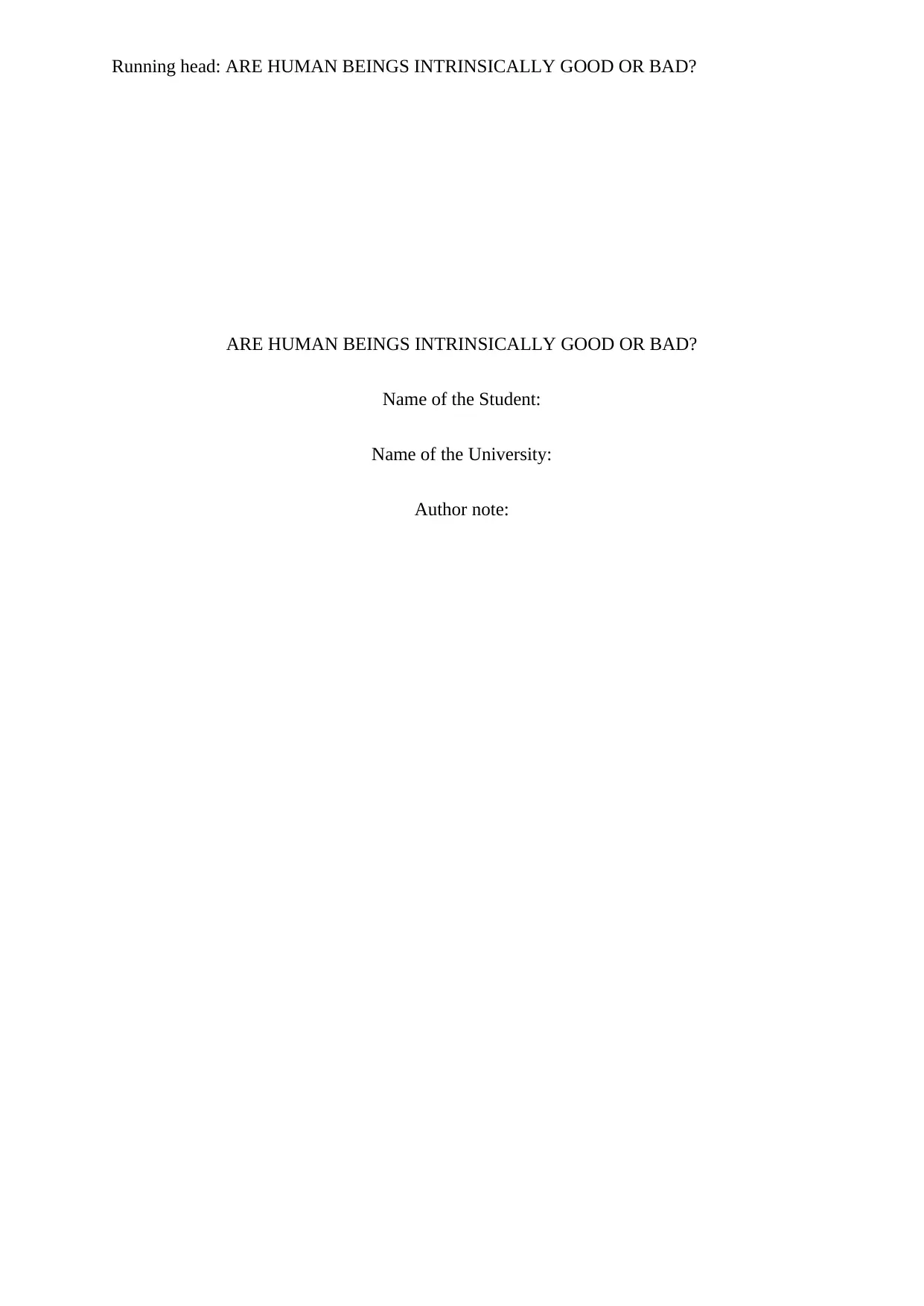
Running head: ARE HUMAN BEINGS INTRINSICALLY GOOD OR BAD?
ARE HUMAN BEINGS INTRINSICALLY GOOD OR BAD?
Name of the Student:
Name of the University:
Author note:
ARE HUMAN BEINGS INTRINSICALLY GOOD OR BAD?
Name of the Student:
Name of the University:
Author note:
Paraphrase This Document
Need a fresh take? Get an instant paraphrase of this document with our AI Paraphraser
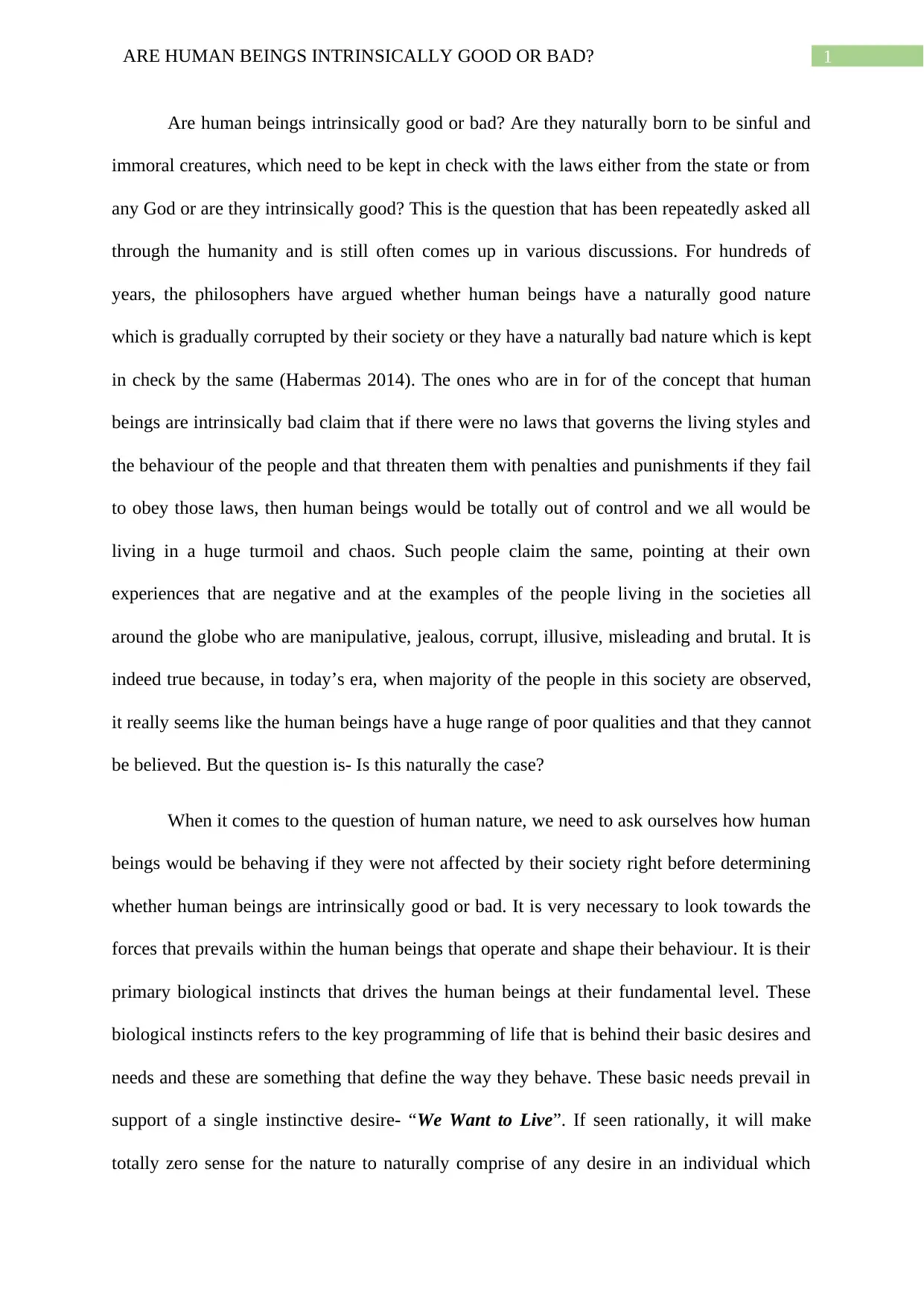
1ARE HUMAN BEINGS INTRINSICALLY GOOD OR BAD?
Are human beings intrinsically good or bad? Are they naturally born to be sinful and
immoral creatures, which need to be kept in check with the laws either from the state or from
any God or are they intrinsically good? This is the question that has been repeatedly asked all
through the humanity and is still often comes up in various discussions. For hundreds of
years, the philosophers have argued whether human beings have a naturally good nature
which is gradually corrupted by their society or they have a naturally bad nature which is kept
in check by the same (Habermas 2014). The ones who are in for of the concept that human
beings are intrinsically bad claim that if there were no laws that governs the living styles and
the behaviour of the people and that threaten them with penalties and punishments if they fail
to obey those laws, then human beings would be totally out of control and we all would be
living in a huge turmoil and chaos. Such people claim the same, pointing at their own
experiences that are negative and at the examples of the people living in the societies all
around the globe who are manipulative, jealous, corrupt, illusive, misleading and brutal. It is
indeed true because, in today’s era, when majority of the people in this society are observed,
it really seems like the human beings have a huge range of poor qualities and that they cannot
be believed. But the question is- Is this naturally the case?
When it comes to the question of human nature, we need to ask ourselves how human
beings would be behaving if they were not affected by their society right before determining
whether human beings are intrinsically good or bad. It is very necessary to look towards the
forces that prevails within the human beings that operate and shape their behaviour. It is their
primary biological instincts that drives the human beings at their fundamental level. These
biological instincts refers to the key programming of life that is behind their basic desires and
needs and these are something that define the way they behave. These basic needs prevail in
support of a single instinctive desire- “We Want to Live”. If seen rationally, it will make
totally zero sense for the nature to naturally comprise of any desire in an individual which
Are human beings intrinsically good or bad? Are they naturally born to be sinful and
immoral creatures, which need to be kept in check with the laws either from the state or from
any God or are they intrinsically good? This is the question that has been repeatedly asked all
through the humanity and is still often comes up in various discussions. For hundreds of
years, the philosophers have argued whether human beings have a naturally good nature
which is gradually corrupted by their society or they have a naturally bad nature which is kept
in check by the same (Habermas 2014). The ones who are in for of the concept that human
beings are intrinsically bad claim that if there were no laws that governs the living styles and
the behaviour of the people and that threaten them with penalties and punishments if they fail
to obey those laws, then human beings would be totally out of control and we all would be
living in a huge turmoil and chaos. Such people claim the same, pointing at their own
experiences that are negative and at the examples of the people living in the societies all
around the globe who are manipulative, jealous, corrupt, illusive, misleading and brutal. It is
indeed true because, in today’s era, when majority of the people in this society are observed,
it really seems like the human beings have a huge range of poor qualities and that they cannot
be believed. But the question is- Is this naturally the case?
When it comes to the question of human nature, we need to ask ourselves how human
beings would be behaving if they were not affected by their society right before determining
whether human beings are intrinsically good or bad. It is very necessary to look towards the
forces that prevails within the human beings that operate and shape their behaviour. It is their
primary biological instincts that drives the human beings at their fundamental level. These
biological instincts refers to the key programming of life that is behind their basic desires and
needs and these are something that define the way they behave. These basic needs prevail in
support of a single instinctive desire- “We Want to Live”. If seen rationally, it will make
totally zero sense for the nature to naturally comprise of any desire in an individual which
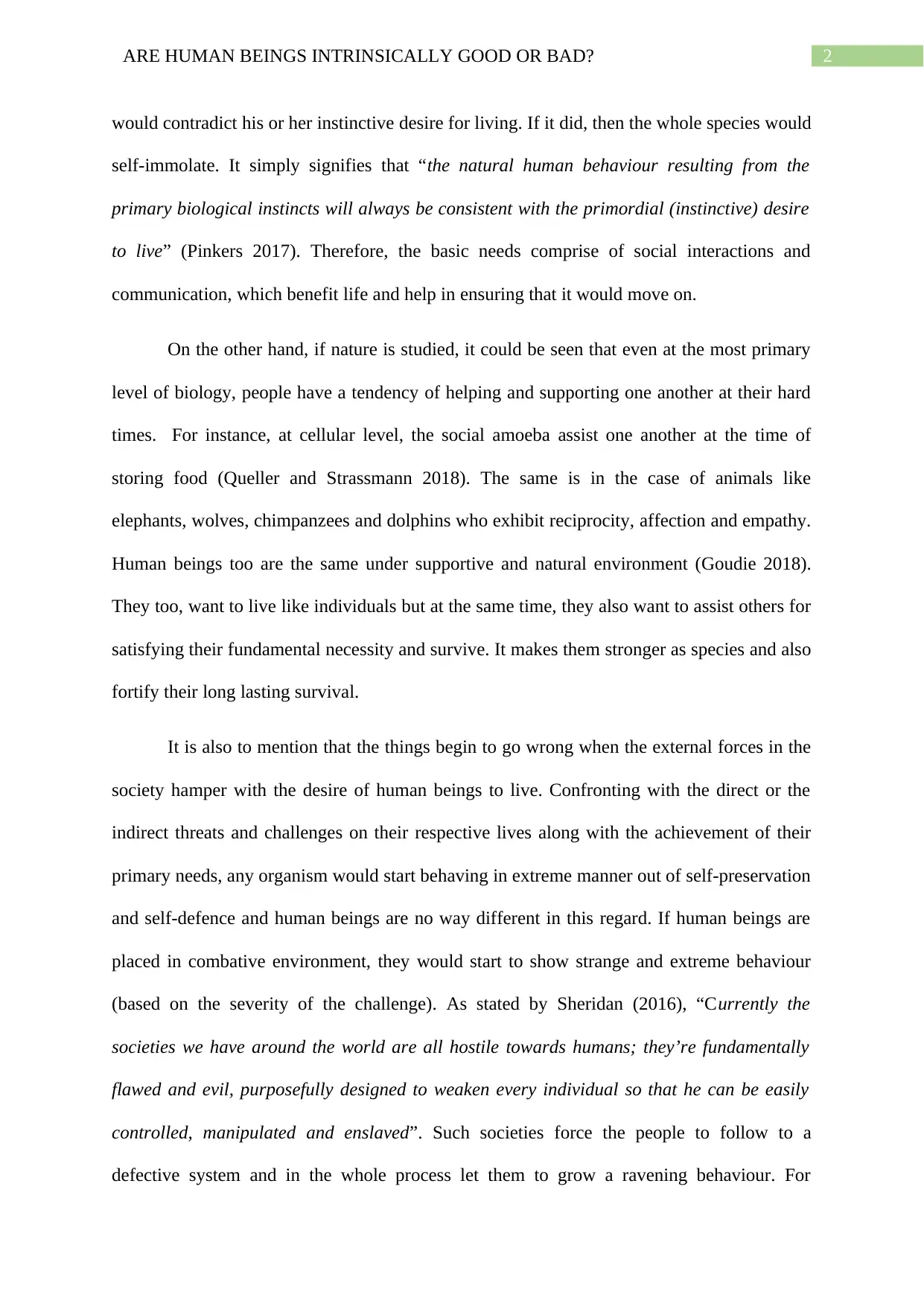
2ARE HUMAN BEINGS INTRINSICALLY GOOD OR BAD?
would contradict his or her instinctive desire for living. If it did, then the whole species would
self-immolate. It simply signifies that “the natural human behaviour resulting from the
primary biological instincts will always be consistent with the primordial (instinctive) desire
to live” (Pinkers 2017). Therefore, the basic needs comprise of social interactions and
communication, which benefit life and help in ensuring that it would move on.
On the other hand, if nature is studied, it could be seen that even at the most primary
level of biology, people have a tendency of helping and supporting one another at their hard
times. For instance, at cellular level, the social amoeba assist one another at the time of
storing food (Queller and Strassmann 2018). The same is in the case of animals like
elephants, wolves, chimpanzees and dolphins who exhibit reciprocity, affection and empathy.
Human beings too are the same under supportive and natural environment (Goudie 2018).
They too, want to live like individuals but at the same time, they also want to assist others for
satisfying their fundamental necessity and survive. It makes them stronger as species and also
fortify their long lasting survival.
It is also to mention that the things begin to go wrong when the external forces in the
society hamper with the desire of human beings to live. Confronting with the direct or the
indirect threats and challenges on their respective lives along with the achievement of their
primary needs, any organism would start behaving in extreme manner out of self-preservation
and self-defence and human beings are no way different in this regard. If human beings are
placed in combative environment, they would start to show strange and extreme behaviour
(based on the severity of the challenge). As stated by Sheridan (2016), “Currently the
societies we have around the world are all hostile towards humans; they’re fundamentally
flawed and evil, purposefully designed to weaken every individual so that he can be easily
controlled, manipulated and enslaved”. Such societies force the people to follow to a
defective system and in the whole process let them to grow a ravening behaviour. For
would contradict his or her instinctive desire for living. If it did, then the whole species would
self-immolate. It simply signifies that “the natural human behaviour resulting from the
primary biological instincts will always be consistent with the primordial (instinctive) desire
to live” (Pinkers 2017). Therefore, the basic needs comprise of social interactions and
communication, which benefit life and help in ensuring that it would move on.
On the other hand, if nature is studied, it could be seen that even at the most primary
level of biology, people have a tendency of helping and supporting one another at their hard
times. For instance, at cellular level, the social amoeba assist one another at the time of
storing food (Queller and Strassmann 2018). The same is in the case of animals like
elephants, wolves, chimpanzees and dolphins who exhibit reciprocity, affection and empathy.
Human beings too are the same under supportive and natural environment (Goudie 2018).
They too, want to live like individuals but at the same time, they also want to assist others for
satisfying their fundamental necessity and survive. It makes them stronger as species and also
fortify their long lasting survival.
It is also to mention that the things begin to go wrong when the external forces in the
society hamper with the desire of human beings to live. Confronting with the direct or the
indirect threats and challenges on their respective lives along with the achievement of their
primary needs, any organism would start behaving in extreme manner out of self-preservation
and self-defence and human beings are no way different in this regard. If human beings are
placed in combative environment, they would start to show strange and extreme behaviour
(based on the severity of the challenge). As stated by Sheridan (2016), “Currently the
societies we have around the world are all hostile towards humans; they’re fundamentally
flawed and evil, purposefully designed to weaken every individual so that he can be easily
controlled, manipulated and enslaved”. Such societies force the people to follow to a
defective system and in the whole process let them to grow a ravening behaviour. For
⊘ This is a preview!⊘
Do you want full access?
Subscribe today to unlock all pages.

Trusted by 1+ million students worldwide
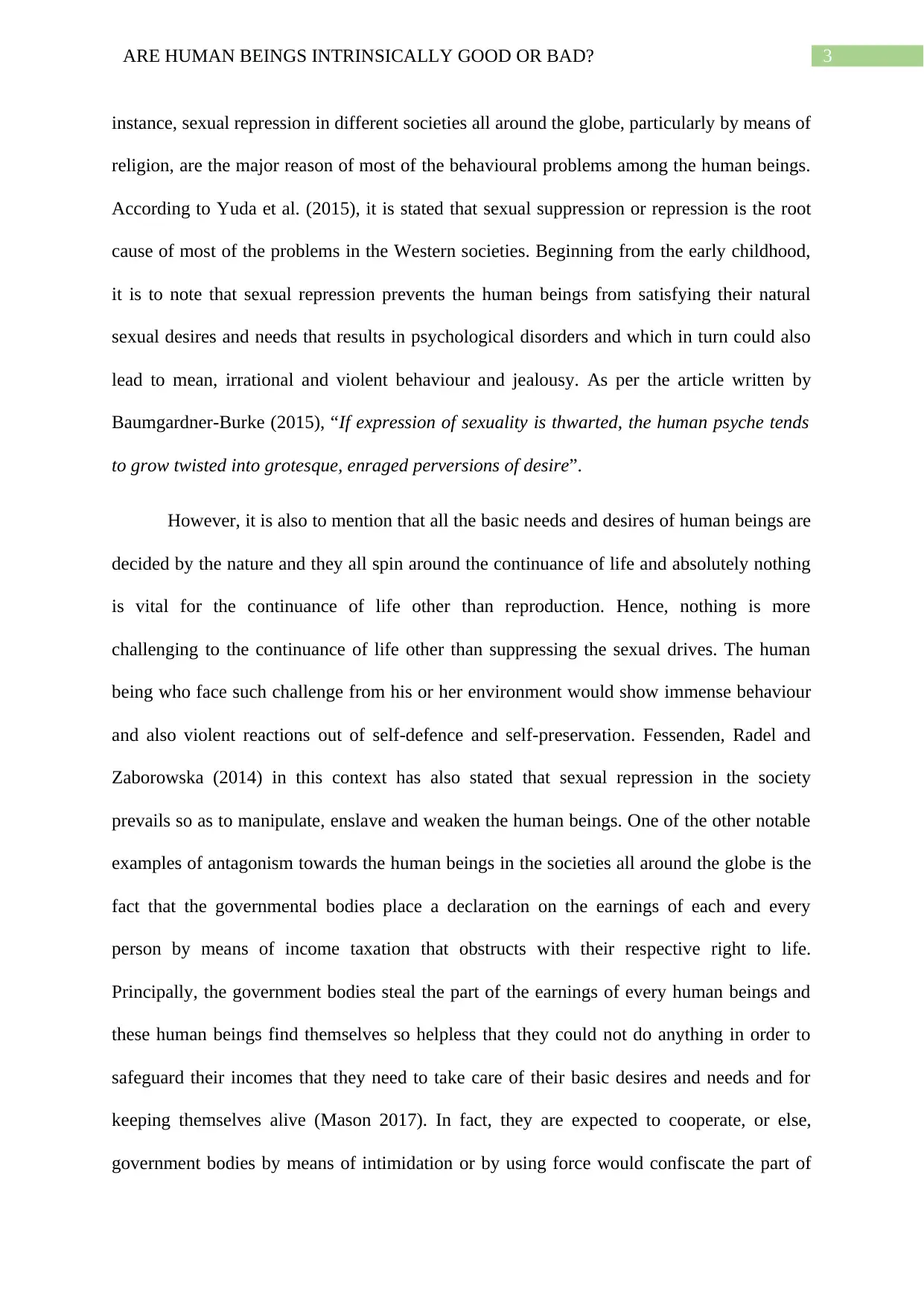
3ARE HUMAN BEINGS INTRINSICALLY GOOD OR BAD?
instance, sexual repression in different societies all around the globe, particularly by means of
religion, are the major reason of most of the behavioural problems among the human beings.
According to Yuda et al. (2015), it is stated that sexual suppression or repression is the root
cause of most of the problems in the Western societies. Beginning from the early childhood,
it is to note that sexual repression prevents the human beings from satisfying their natural
sexual desires and needs that results in psychological disorders and which in turn could also
lead to mean, irrational and violent behaviour and jealousy. As per the article written by
Baumgardner-Burke (2015), “If expression of sexuality is thwarted, the human psyche tends
to grow twisted into grotesque, enraged perversions of desire”.
However, it is also to mention that all the basic needs and desires of human beings are
decided by the nature and they all spin around the continuance of life and absolutely nothing
is vital for the continuance of life other than reproduction. Hence, nothing is more
challenging to the continuance of life other than suppressing the sexual drives. The human
being who face such challenge from his or her environment would show immense behaviour
and also violent reactions out of self-defence and self-preservation. Fessenden, Radel and
Zaborowska (2014) in this context has also stated that sexual repression in the society
prevails so as to manipulate, enslave and weaken the human beings. One of the other notable
examples of antagonism towards the human beings in the societies all around the globe is the
fact that the governmental bodies place a declaration on the earnings of each and every
person by means of income taxation that obstructs with their respective right to life.
Principally, the government bodies steal the part of the earnings of every human beings and
these human beings find themselves so helpless that they could not do anything in order to
safeguard their incomes that they need to take care of their basic desires and needs and for
keeping themselves alive (Mason 2017). In fact, they are expected to cooperate, or else,
government bodies by means of intimidation or by using force would confiscate the part of
instance, sexual repression in different societies all around the globe, particularly by means of
religion, are the major reason of most of the behavioural problems among the human beings.
According to Yuda et al. (2015), it is stated that sexual suppression or repression is the root
cause of most of the problems in the Western societies. Beginning from the early childhood,
it is to note that sexual repression prevents the human beings from satisfying their natural
sexual desires and needs that results in psychological disorders and which in turn could also
lead to mean, irrational and violent behaviour and jealousy. As per the article written by
Baumgardner-Burke (2015), “If expression of sexuality is thwarted, the human psyche tends
to grow twisted into grotesque, enraged perversions of desire”.
However, it is also to mention that all the basic needs and desires of human beings are
decided by the nature and they all spin around the continuance of life and absolutely nothing
is vital for the continuance of life other than reproduction. Hence, nothing is more
challenging to the continuance of life other than suppressing the sexual drives. The human
being who face such challenge from his or her environment would show immense behaviour
and also violent reactions out of self-defence and self-preservation. Fessenden, Radel and
Zaborowska (2014) in this context has also stated that sexual repression in the society
prevails so as to manipulate, enslave and weaken the human beings. One of the other notable
examples of antagonism towards the human beings in the societies all around the globe is the
fact that the governmental bodies place a declaration on the earnings of each and every
person by means of income taxation that obstructs with their respective right to life.
Principally, the government bodies steal the part of the earnings of every human beings and
these human beings find themselves so helpless that they could not do anything in order to
safeguard their incomes that they need to take care of their basic desires and needs and for
keeping themselves alive (Mason 2017). In fact, they are expected to cooperate, or else,
government bodies by means of intimidation or by using force would confiscate the part of
Paraphrase This Document
Need a fresh take? Get an instant paraphrase of this document with our AI Paraphraser
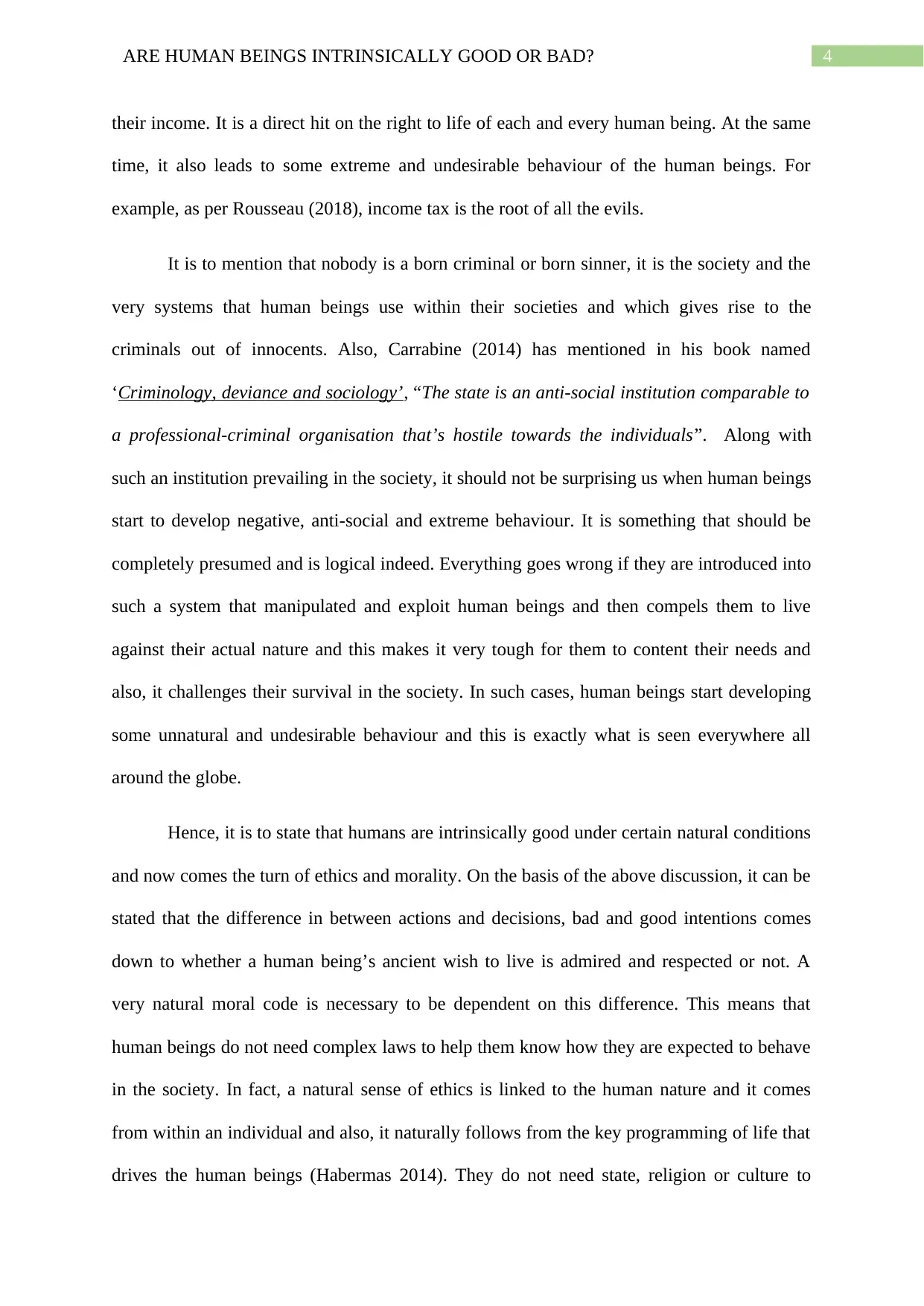
4ARE HUMAN BEINGS INTRINSICALLY GOOD OR BAD?
their income. It is a direct hit on the right to life of each and every human being. At the same
time, it also leads to some extreme and undesirable behaviour of the human beings. For
example, as per Rousseau (2018), income tax is the root of all the evils.
It is to mention that nobody is a born criminal or born sinner, it is the society and the
very systems that human beings use within their societies and which gives rise to the
criminals out of innocents. Also, Carrabine (2014) has mentioned in his book named
‘Criminology, deviance and sociology’, “The state is an anti-social institution comparable to
a professional-criminal organisation that’s hostile towards the individuals”. Along with
such an institution prevailing in the society, it should not be surprising us when human beings
start to develop negative, anti-social and extreme behaviour. It is something that should be
completely presumed and is logical indeed. Everything goes wrong if they are introduced into
such a system that manipulated and exploit human beings and then compels them to live
against their actual nature and this makes it very tough for them to content their needs and
also, it challenges their survival in the society. In such cases, human beings start developing
some unnatural and undesirable behaviour and this is exactly what is seen everywhere all
around the globe.
Hence, it is to state that humans are intrinsically good under certain natural conditions
and now comes the turn of ethics and morality. On the basis of the above discussion, it can be
stated that the difference in between actions and decisions, bad and good intentions comes
down to whether a human being’s ancient wish to live is admired and respected or not. A
very natural moral code is necessary to be dependent on this difference. This means that
human beings do not need complex laws to help them know how they are expected to behave
in the society. In fact, a natural sense of ethics is linked to the human nature and it comes
from within an individual and also, it naturally follows from the key programming of life that
drives the human beings (Habermas 2014). They do not need state, religion or culture to
their income. It is a direct hit on the right to life of each and every human being. At the same
time, it also leads to some extreme and undesirable behaviour of the human beings. For
example, as per Rousseau (2018), income tax is the root of all the evils.
It is to mention that nobody is a born criminal or born sinner, it is the society and the
very systems that human beings use within their societies and which gives rise to the
criminals out of innocents. Also, Carrabine (2014) has mentioned in his book named
‘Criminology, deviance and sociology’, “The state is an anti-social institution comparable to
a professional-criminal organisation that’s hostile towards the individuals”. Along with
such an institution prevailing in the society, it should not be surprising us when human beings
start to develop negative, anti-social and extreme behaviour. It is something that should be
completely presumed and is logical indeed. Everything goes wrong if they are introduced into
such a system that manipulated and exploit human beings and then compels them to live
against their actual nature and this makes it very tough for them to content their needs and
also, it challenges their survival in the society. In such cases, human beings start developing
some unnatural and undesirable behaviour and this is exactly what is seen everywhere all
around the globe.
Hence, it is to state that humans are intrinsically good under certain natural conditions
and now comes the turn of ethics and morality. On the basis of the above discussion, it can be
stated that the difference in between actions and decisions, bad and good intentions comes
down to whether a human being’s ancient wish to live is admired and respected or not. A
very natural moral code is necessary to be dependent on this difference. This means that
human beings do not need complex laws to help them know how they are expected to behave
in the society. In fact, a natural sense of ethics is linked to the human nature and it comes
from within an individual and also, it naturally follows from the key programming of life that
drives the human beings (Habermas 2014). They do not need state, religion or culture to
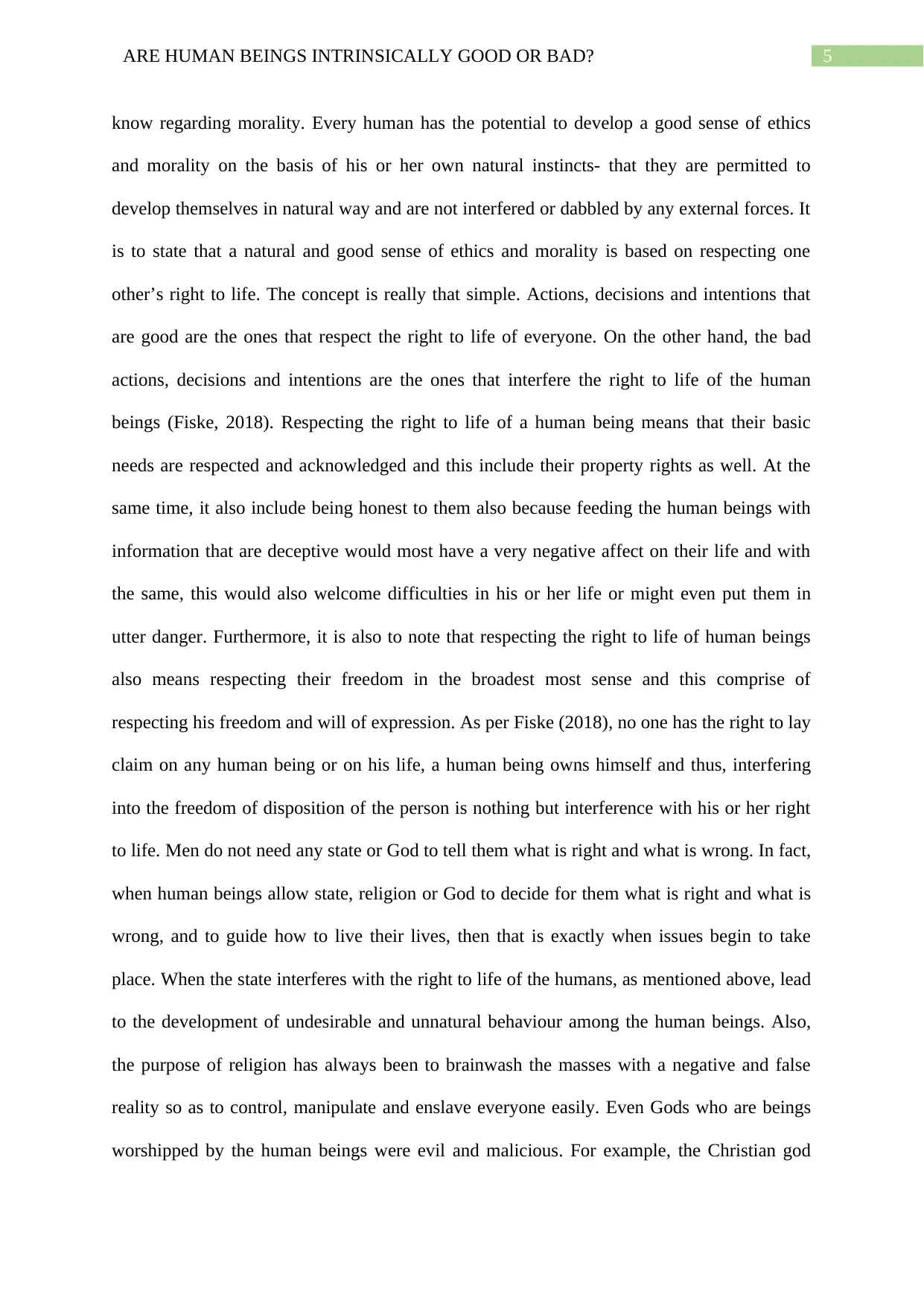
5ARE HUMAN BEINGS INTRINSICALLY GOOD OR BAD?
know regarding morality. Every human has the potential to develop a good sense of ethics
and morality on the basis of his or her own natural instincts- that they are permitted to
develop themselves in natural way and are not interfered or dabbled by any external forces. It
is to state that a natural and good sense of ethics and morality is based on respecting one
other’s right to life. The concept is really that simple. Actions, decisions and intentions that
are good are the ones that respect the right to life of everyone. On the other hand, the bad
actions, decisions and intentions are the ones that interfere the right to life of the human
beings (Fiske, 2018). Respecting the right to life of a human being means that their basic
needs are respected and acknowledged and this include their property rights as well. At the
same time, it also include being honest to them also because feeding the human beings with
information that are deceptive would most have a very negative affect on their life and with
the same, this would also welcome difficulties in his or her life or might even put them in
utter danger. Furthermore, it is also to note that respecting the right to life of human beings
also means respecting their freedom in the broadest most sense and this comprise of
respecting his freedom and will of expression. As per Fiske (2018), no one has the right to lay
claim on any human being or on his life, a human being owns himself and thus, interfering
into the freedom of disposition of the person is nothing but interference with his or her right
to life. Men do not need any state or God to tell them what is right and what is wrong. In fact,
when human beings allow state, religion or God to decide for them what is right and what is
wrong, and to guide how to live their lives, then that is exactly when issues begin to take
place. When the state interferes with the right to life of the humans, as mentioned above, lead
to the development of undesirable and unnatural behaviour among the human beings. Also,
the purpose of religion has always been to brainwash the masses with a negative and false
reality so as to control, manipulate and enslave everyone easily. Even Gods who are beings
worshipped by the human beings were evil and malicious. For example, the Christian god
know regarding morality. Every human has the potential to develop a good sense of ethics
and morality on the basis of his or her own natural instincts- that they are permitted to
develop themselves in natural way and are not interfered or dabbled by any external forces. It
is to state that a natural and good sense of ethics and morality is based on respecting one
other’s right to life. The concept is really that simple. Actions, decisions and intentions that
are good are the ones that respect the right to life of everyone. On the other hand, the bad
actions, decisions and intentions are the ones that interfere the right to life of the human
beings (Fiske, 2018). Respecting the right to life of a human being means that their basic
needs are respected and acknowledged and this include their property rights as well. At the
same time, it also include being honest to them also because feeding the human beings with
information that are deceptive would most have a very negative affect on their life and with
the same, this would also welcome difficulties in his or her life or might even put them in
utter danger. Furthermore, it is also to note that respecting the right to life of human beings
also means respecting their freedom in the broadest most sense and this comprise of
respecting his freedom and will of expression. As per Fiske (2018), no one has the right to lay
claim on any human being or on his life, a human being owns himself and thus, interfering
into the freedom of disposition of the person is nothing but interference with his or her right
to life. Men do not need any state or God to tell them what is right and what is wrong. In fact,
when human beings allow state, religion or God to decide for them what is right and what is
wrong, and to guide how to live their lives, then that is exactly when issues begin to take
place. When the state interferes with the right to life of the humans, as mentioned above, lead
to the development of undesirable and unnatural behaviour among the human beings. Also,
the purpose of religion has always been to brainwash the masses with a negative and false
reality so as to control, manipulate and enslave everyone easily. Even Gods who are beings
worshipped by the human beings were evil and malicious. For example, the Christian god
⊘ This is a preview!⊘
Do you want full access?
Subscribe today to unlock all pages.

Trusted by 1+ million students worldwide
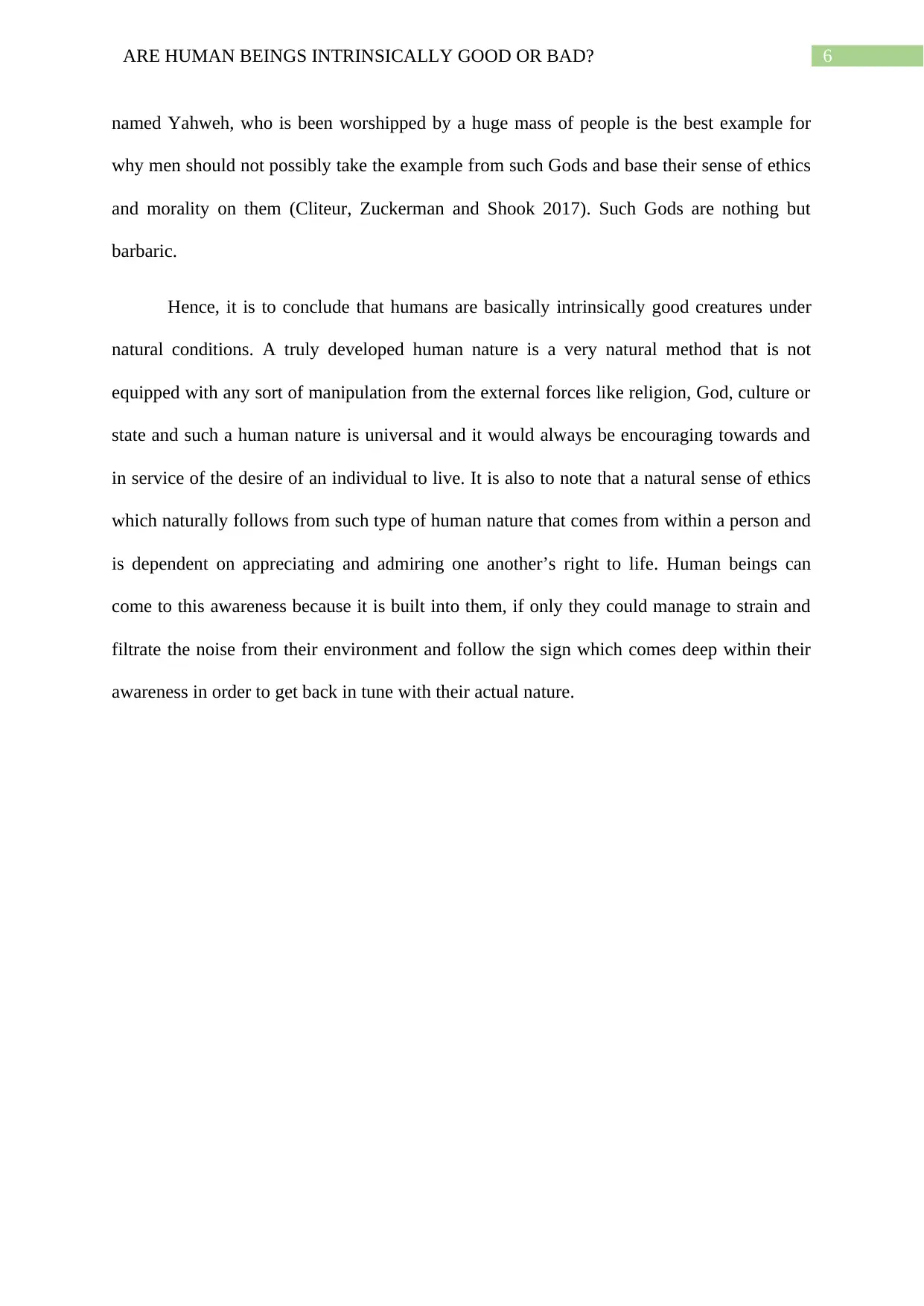
6ARE HUMAN BEINGS INTRINSICALLY GOOD OR BAD?
named Yahweh, who is been worshipped by a huge mass of people is the best example for
why men should not possibly take the example from such Gods and base their sense of ethics
and morality on them (Cliteur, Zuckerman and Shook 2017). Such Gods are nothing but
barbaric.
Hence, it is to conclude that humans are basically intrinsically good creatures under
natural conditions. A truly developed human nature is a very natural method that is not
equipped with any sort of manipulation from the external forces like religion, God, culture or
state and such a human nature is universal and it would always be encouraging towards and
in service of the desire of an individual to live. It is also to note that a natural sense of ethics
which naturally follows from such type of human nature that comes from within a person and
is dependent on appreciating and admiring one another’s right to life. Human beings can
come to this awareness because it is built into them, if only they could manage to strain and
filtrate the noise from their environment and follow the sign which comes deep within their
awareness in order to get back in tune with their actual nature.
named Yahweh, who is been worshipped by a huge mass of people is the best example for
why men should not possibly take the example from such Gods and base their sense of ethics
and morality on them (Cliteur, Zuckerman and Shook 2017). Such Gods are nothing but
barbaric.
Hence, it is to conclude that humans are basically intrinsically good creatures under
natural conditions. A truly developed human nature is a very natural method that is not
equipped with any sort of manipulation from the external forces like religion, God, culture or
state and such a human nature is universal and it would always be encouraging towards and
in service of the desire of an individual to live. It is also to note that a natural sense of ethics
which naturally follows from such type of human nature that comes from within a person and
is dependent on appreciating and admiring one another’s right to life. Human beings can
come to this awareness because it is built into them, if only they could manage to strain and
filtrate the noise from their environment and follow the sign which comes deep within their
awareness in order to get back in tune with their actual nature.
Paraphrase This Document
Need a fresh take? Get an instant paraphrase of this document with our AI Paraphraser
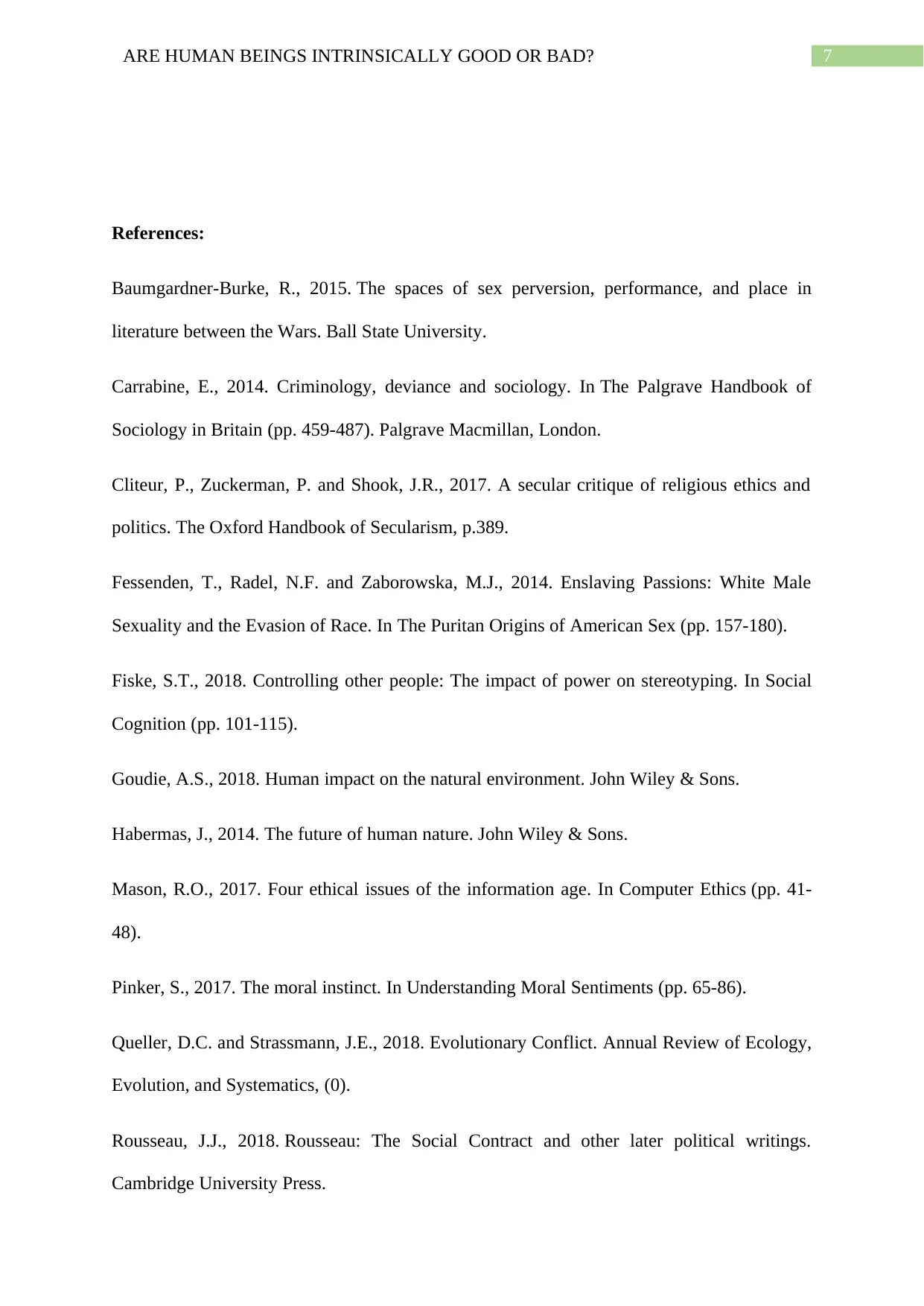
7ARE HUMAN BEINGS INTRINSICALLY GOOD OR BAD?
References:
Baumgardner-Burke, R., 2015. The spaces of sex perversion, performance, and place in
literature between the Wars. Ball State University.
Carrabine, E., 2014. Criminology, deviance and sociology. In The Palgrave Handbook of
Sociology in Britain (pp. 459-487). Palgrave Macmillan, London.
Cliteur, P., Zuckerman, P. and Shook, J.R., 2017. A secular critique of religious ethics and
politics. The Oxford Handbook of Secularism, p.389.
Fessenden, T., Radel, N.F. and Zaborowska, M.J., 2014. Enslaving Passions: White Male
Sexuality and the Evasion of Race. In The Puritan Origins of American Sex (pp. 157-180).
Fiske, S.T., 2018. Controlling other people: The impact of power on stereotyping. In Social
Cognition (pp. 101-115).
Goudie, A.S., 2018. Human impact on the natural environment. John Wiley & Sons.
Habermas, J., 2014. The future of human nature. John Wiley & Sons.
Mason, R.O., 2017. Four ethical issues of the information age. In Computer Ethics (pp. 41-
48).
Pinker, S., 2017. The moral instinct. In Understanding Moral Sentiments (pp. 65-86).
Queller, D.C. and Strassmann, J.E., 2018. Evolutionary Conflict. Annual Review of Ecology,
Evolution, and Systematics, (0).
Rousseau, J.J., 2018. Rousseau: The Social Contract and other later political writings.
Cambridge University Press.
References:
Baumgardner-Burke, R., 2015. The spaces of sex perversion, performance, and place in
literature between the Wars. Ball State University.
Carrabine, E., 2014. Criminology, deviance and sociology. In The Palgrave Handbook of
Sociology in Britain (pp. 459-487). Palgrave Macmillan, London.
Cliteur, P., Zuckerman, P. and Shook, J.R., 2017. A secular critique of religious ethics and
politics. The Oxford Handbook of Secularism, p.389.
Fessenden, T., Radel, N.F. and Zaborowska, M.J., 2014. Enslaving Passions: White Male
Sexuality and the Evasion of Race. In The Puritan Origins of American Sex (pp. 157-180).
Fiske, S.T., 2018. Controlling other people: The impact of power on stereotyping. In Social
Cognition (pp. 101-115).
Goudie, A.S., 2018. Human impact on the natural environment. John Wiley & Sons.
Habermas, J., 2014. The future of human nature. John Wiley & Sons.
Mason, R.O., 2017. Four ethical issues of the information age. In Computer Ethics (pp. 41-
48).
Pinker, S., 2017. The moral instinct. In Understanding Moral Sentiments (pp. 65-86).
Queller, D.C. and Strassmann, J.E., 2018. Evolutionary Conflict. Annual Review of Ecology,
Evolution, and Systematics, (0).
Rousseau, J.J., 2018. Rousseau: The Social Contract and other later political writings.
Cambridge University Press.
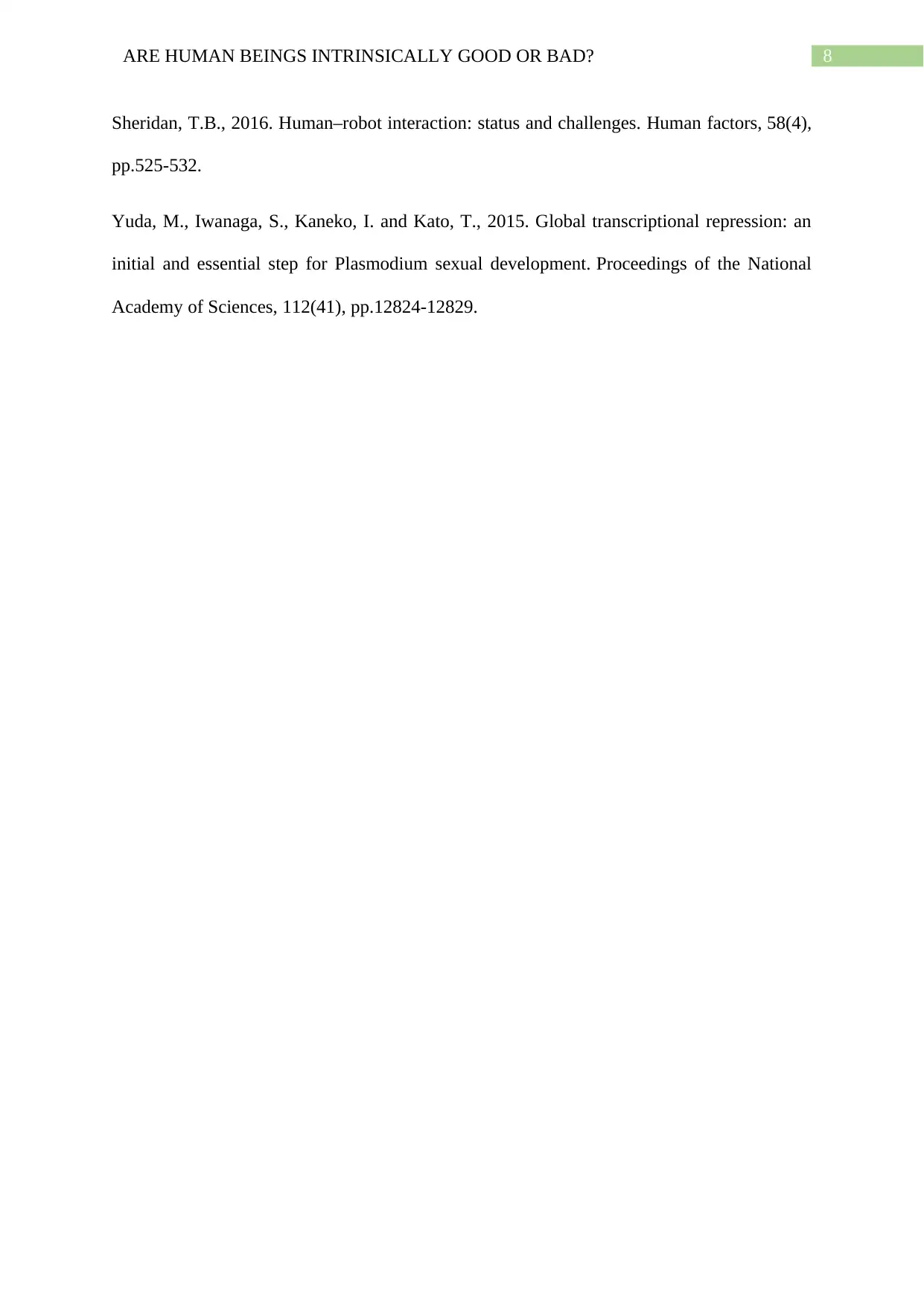
8ARE HUMAN BEINGS INTRINSICALLY GOOD OR BAD?
Sheridan, T.B., 2016. Human–robot interaction: status and challenges. Human factors, 58(4),
pp.525-532.
Yuda, M., Iwanaga, S., Kaneko, I. and Kato, T., 2015. Global transcriptional repression: an
initial and essential step for Plasmodium sexual development. Proceedings of the National
Academy of Sciences, 112(41), pp.12824-12829.
Sheridan, T.B., 2016. Human–robot interaction: status and challenges. Human factors, 58(4),
pp.525-532.
Yuda, M., Iwanaga, S., Kaneko, I. and Kato, T., 2015. Global transcriptional repression: an
initial and essential step for Plasmodium sexual development. Proceedings of the National
Academy of Sciences, 112(41), pp.12824-12829.
⊘ This is a preview!⊘
Do you want full access?
Subscribe today to unlock all pages.

Trusted by 1+ million students worldwide
1 out of 9
Related Documents
Your All-in-One AI-Powered Toolkit for Academic Success.
+13062052269
info@desklib.com
Available 24*7 on WhatsApp / Email
![[object Object]](/_next/static/media/star-bottom.7253800d.svg)
Unlock your academic potential
Copyright © 2020–2026 A2Z Services. All Rights Reserved. Developed and managed by ZUCOL.



